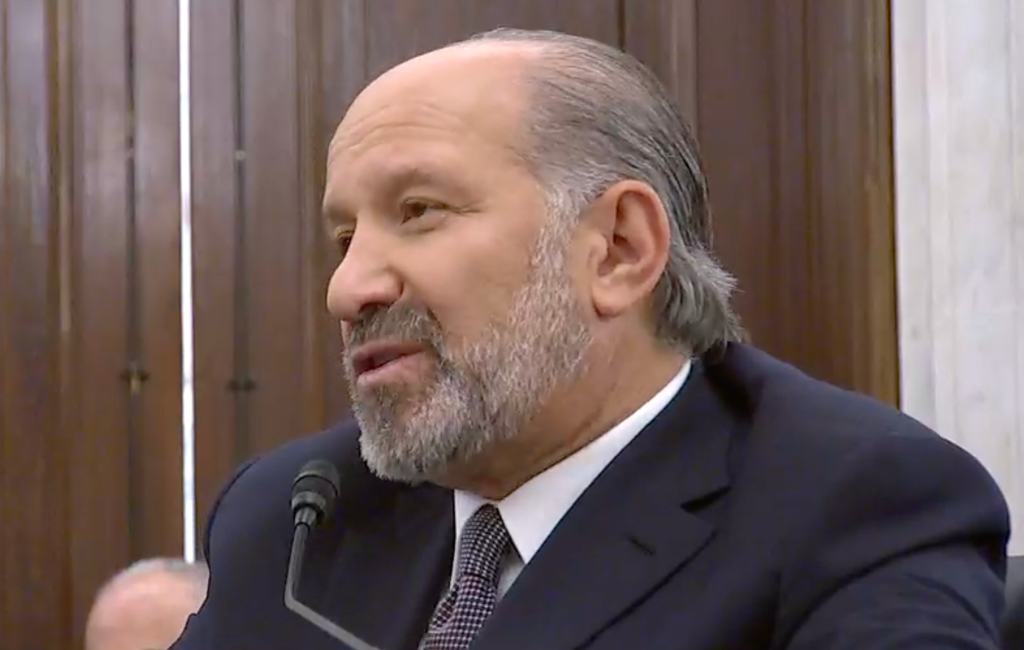Lutnick Receptive to GOP Critiques of BEAD, Declines to Commit to Approved Spending
Trump's nominee for Commerce Secretary said he wanted to review plans aproved by the Biden administration.
Jake Neenan

WASHINGTON, Jan. 29, 2025 – Howard Lutnick, President Donald Trump’s pick to head the Commerce Department, said he was open to Republican criticisms of the Broadband Equity, Access, and Deployment program, and side-stepped questions about honoring existing approvals of state spending plans.
Three states received approval to start spending their slice of the $42.5 billion program in the final days of the Biden administration: Louisiana, Nevada, and Delaware.
Each state and territory is managing its own allocation and ultimately selecting the ISPs that will be participating within its borders, with Commerce’s National Telecommunications and Information Administration managing the program and setting guidelines.
Lutnick declined to commit to not making Nevada go through its project selection process again, responding to a question from Sen. Jacky Rosen, D-Nevada. Lutnick said that he wanted to review the state’s spending plan first.
“If it has been rigorously done and deeply efficient, and it’s the most efficient use to get broadband to your constituents, then it’s easy for me to commit to it,” he said. “But if there’s been errors or mistakes, you wouldn’t mind if we made it better. You wouldn't mind.”
Rosen and other Democratic lawmakers were not pleased.
“The project has already been approved,” she said. “We are about to build out. Allocations and appropriations from Congress are not suggestions, it is the law.”
Confusion about state of BEAD funding
On Monday evening, the White House had circulated a memo directing agencies to pause all federal grant disbursements pending reviews of their ideological alignment with the Trump administration, causing confusion in the industry over the fate of BEAD and other programs.
Opponents decried it as an illegal infringement on Congress’s spending power, and a court issued a stay after nonprofit groups sued. The White House withdrew the memo during Lutnick’s confirmation hearing, but said certain energy programs and others were still on hold.
Asked if he would follow instructions to cut BEAD money already appropriated by Congress and obligated by NTIA, Lutnick said “I work for the president.” Pressed by Sen. Ben Ray Luján, D-N.M., Lutnick said, “you appropriated it, and my objective is to execute what has been appropriated. That is my objective. If the president has other objectives, I will sit down and talk with him about it.”
Republicans in Congress, including Senate Commerce Committee Chair Ted Cruz, R-Texas, and Senate Majority Leader John Thune, R-N.D., have made it clear they would like to see some provisions of the program changed, chiefly but not solely its preference for fiber broadband.
For Blair Levin, policy advisor at New Street Research and former FCC chief of staff, Lutnick’s testimony was further evidence the Trump administration will seek to shift BEAD dollars from fiber to satellite and fixed wireless.
Indeed, Lutnick was receptive to a more technology neutral approach: “Let’s use satellites, let’s use fixed wireless, let’s use fiber, let’s do it the cheapest, most efficient way we can,” he said of the program.
He agreed to Cruz’s request that he work with Cruz’s office to “review” the program and “refocus it on Congress’s core objectives of deploying high-speed internet to unserved areas in a tech-neutral manner, and not pursuing extraneous or partisan social goals.”
States are currently allowed to fund non-fiber projects, as long as no qualifying fiber providers are interested in a given area or fiber would be too expensive. More than half have begun fielding grant applications under the current rules, but the NTIA isn’t expected to approve new spending plans until Trump appointees are officially in control.
“BEAD will continue but there is likely to be some pause,” Levin wrote in an investor note after the hearing. “And some rules that reduce the amount that would, under the current framework, go to fiber and move funds to satellite.”
Question about non-deployment funds
Asked by Thune whether he would “work to ensure that this BEAD funding is only used for actual broadband infrastructure builds,” Lutnick said, “Absolutely.”
States expecting leftover BEAD funds after connecting each eligible home and business are planning to spend them on things like workforce development and digital skills training, something allowed for by the program.
The Infrastructure Act allowed spending on broadband adoption initiatives and other activities in addition to deployment. Louisiana’s approved BEAD plan allocated more than $500 million on non-deployment efforts.
“The speed and certainty of his answer suggests to us that he may not have been fully briefed on the issue,” Levin wrote in an investor note after the hearing. Levin said state governors would likely push back against any attempt to block non-deployment spending.
Joe Kane, director of broadband and spectrum policy at ITIF, said in an interview with Broadband Breakfast that Thune may have been referring to taking out provisions like labor and middle class affordability requirements, seen by the GOP as extraneous, rather than nixing non-deployment spending itself.









Member discussion